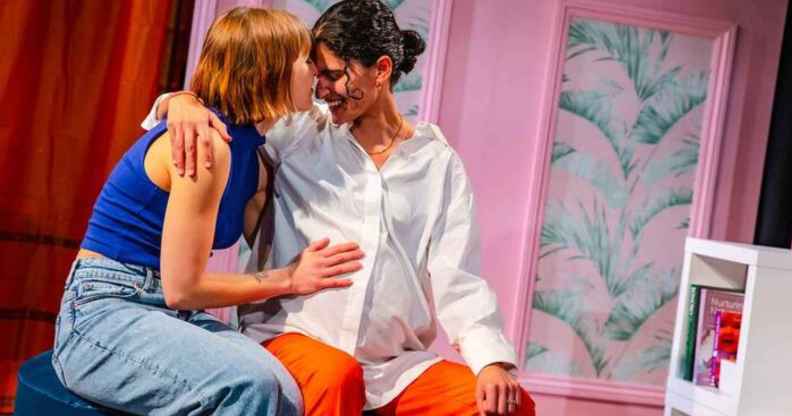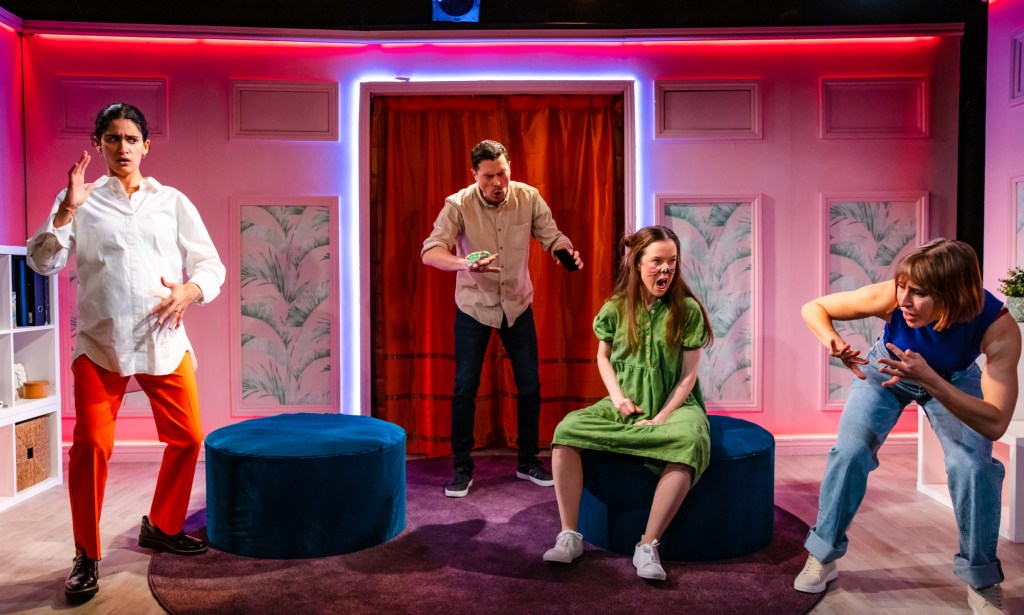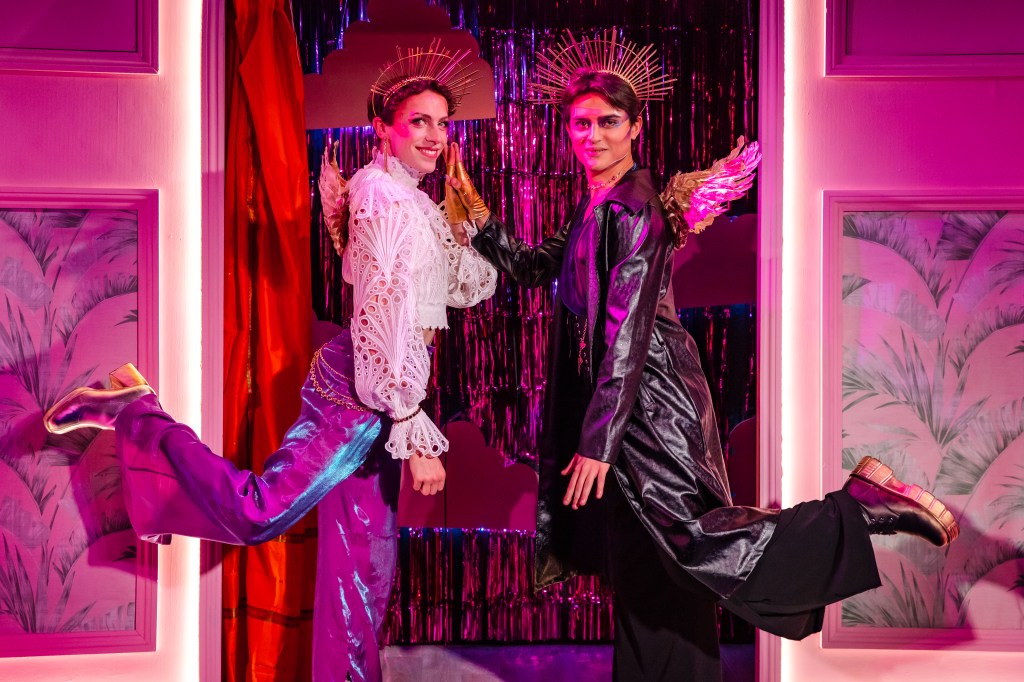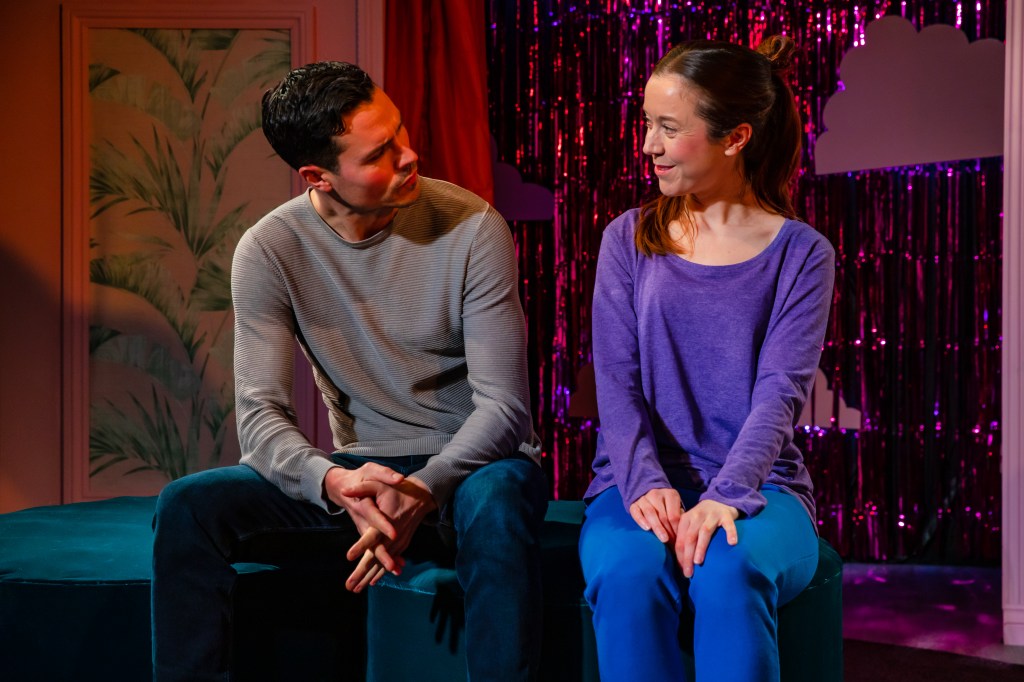The Boys Are Kissing brilliantly skewers the moral panic over LGBTQ-inclusive education

Eleanor Wyld (Chloe) and Seyan Sarvan (Amira) in The Boys Are Kissing. (Danny Kaan)
In an era rife with outrage and misinformation, playwright Zak Zarafshan’s powerful debut The Boys Are Kissing confronts the endless debate over inclusive sex and relationships education.
The play centres on a dispute that could feasibly occur at school gates anywhere in the country. When two nine-year-old boys are spotted kissing in the playground, their parents, lesbian couple Amira (Seyan Sarvan) and Chloe (Eleanor Wyld), and straight couple Matt (Philip Correia) and Sarah (Amy McAllister), immediately come to blows.
As WhatsApp mums, dubious grandparents and innocent children get drawn into the drama, the parents are given a helping hand from two angelic cherubs (Shane Convery and Kishore Walker) with a divine duty to put out tiny gay fires.
“The idea for this play was sparked by anti-LGBT education protests, and the sense that, as a society, we increasingly seem to define ourselves in opposition to others,” Zarafshan explained. “I wanted to explore the impact this has on family and community”.

LGBTQ-inclusive education has long been a topic of fierce debate in the UK’s political landscape. While Margaret Thatcher’s notorious implementation of Section 28, which prohibited the promotion of homosexuality in schools, was repealed in 2003, the repercussions are still felt today.
In 2019, the debate made headlines after parents in Birmingham protested the No Outsiders programme, which includes material on LGBTQ+ relationships.
Zarafshan’s play has caught the mood of a fraught nation, especially given the recent petition requesting the removal of LGBT content from the relationships curriculum, which amassed over 200,000 signatures but ultimately failed after the government confirmed it would not change its stance on the matter.
Meanwhile, LGBTQ+ youth charity Just Like Us has found that LGBTQ+ school pupils are twice as likely to be victims of schoolyard bullying.
The Boys Are Kissing goes beyond the headlines, delving into the human cost of the divisive discourse and the harm it has on the next generation of LGBTQ+ youth.
Amira, a no-nonsense pregnant lawyer, and Chloe, her peacemaker and diplomat wife, crystallise the alienation LGBTQ+ couples – particularly from ethnic minority backgrounds – face even today.
On the flip side, Matt, a father trying to unlearn toxic masculinity, and Sarah, a naive mother, show the pitfalls of performative allyship.
As Amira, Chloe, Matt and Sarah clash on the best way to handle the kiss between their sons, the plays deftly handles the different perspectives made on all sides of the debate. Amira, for instance, takes the stance that the kiss is no big deal, while Matt expresses concerns that the boys are too young to know what they are doing.

Chloe and Sarah, on the other hand, show that discord is sometimes necessary to effect change as opposed to being a passive bystander.
The introduction of the cherubs, meanwhile, injects a much-needed dose of camp: think fabulous outfits, Britney Spears, and conniving plans. Their ability to switch in and out of different characters, lip sync for their lives and deliver emotionally complex scenes keeps the audience engaged throughout.
The cherubs also deliver a light-hearted counterpoint to a plot that sees children become the victims of homophobic bullying and adults making terrible decisions.
We reach catharsis as our leads go on a journey of acceptance and understanding, building bridges between communities – and figuring out when to burn them down.
Zarafshan’s witty writing, expertly delivered by our lead actors, walks the line between awkwardness and self-awareness; and while the play does suffer at times from attempting to tackle heavy themes which don’t have the space to be explored, such as Samir and Amira’s abortion crisis, there are also poignant moments of intergenerational healing.

To his credit, Zarafshan makes a valiant effort to unpick the problems faced by the LGBTQ+ community through an intersectional lens, taking into account race, class and gender.
As the play draws to a close, the audience is forced to reflect on who is really being centred in the narrative. Is there a way forward that champions LGBTQ+ youth while tackling the fears of adults who are wedded to ignorance and bigotry?
While The Boys Are Kissing does not offer concrete answers, it does offer up one overarching truth: empathy will help everyone navigate difficult conversations.
The Boys Are Kissing runs at Theatre503 until 4 February. Tickets are available here.
How did this story make you feel?

